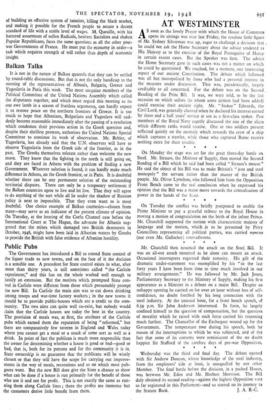Balkan Talks
It is not in the nature of Balkan quarrels that they can be settled by round-table discussions. But that is not the only handicap to the meeting of the representatives of Albania, Bulgaria, Greece and Yugoslavia in Paris this week. The most sanguine members of the Political Committee of the United Nations Assembly which called the disputants together, and which must regard this meeting as its one ewe lamb in a season of fruitless arguments, can hardly expect it to restore peace on the northern frontiers of Greece. It is too much to hope that Albanians, Bulgarians and Yugoslays will sud- denly become reasonable immediately after the passing of a resolution which condemns their previous action in the Greek question and, despite their shrillest protests, authorises the United Nations Special Committee to continue its work of observation. Mr. Bebler, of Yugoslavia, has already said that the U.N. observers will have to observe Yugoslavia from the Greek side of the frontier, as in the past. The Greeks themselves tolerate rather than welcome the new move. They know that the fighting in the north is still going on, and they are faced in Athens with the problem of finding a new Government. Whatever solution is found, it can hardly make much difference in Athens, on the Greek frontier, or in Paris. It is doubtful whether there can be any permanent solution of the outstanding territorial disputes. There can only be a temporary settlement if the Balkan countries agree to live and let live. That they will agree to do anything of the sort while all lie under the shadow of Russian policy is next to impossible. That they even want to is most doubtful. One choice example of Balkan courtesies—chosen from many—may serve as an indicator of the present climate of opinion. On Tuesday, at the hearing of the Corfu Channel case before the International Court at The Hague, the advocate for Albania sug- gested that the mines which damaged two British destroyers in October, 1946, might have been laid in Albanian waters by Greeks to provide the British with false evidence of Albanian hostility.


































 Previous page
Previous page